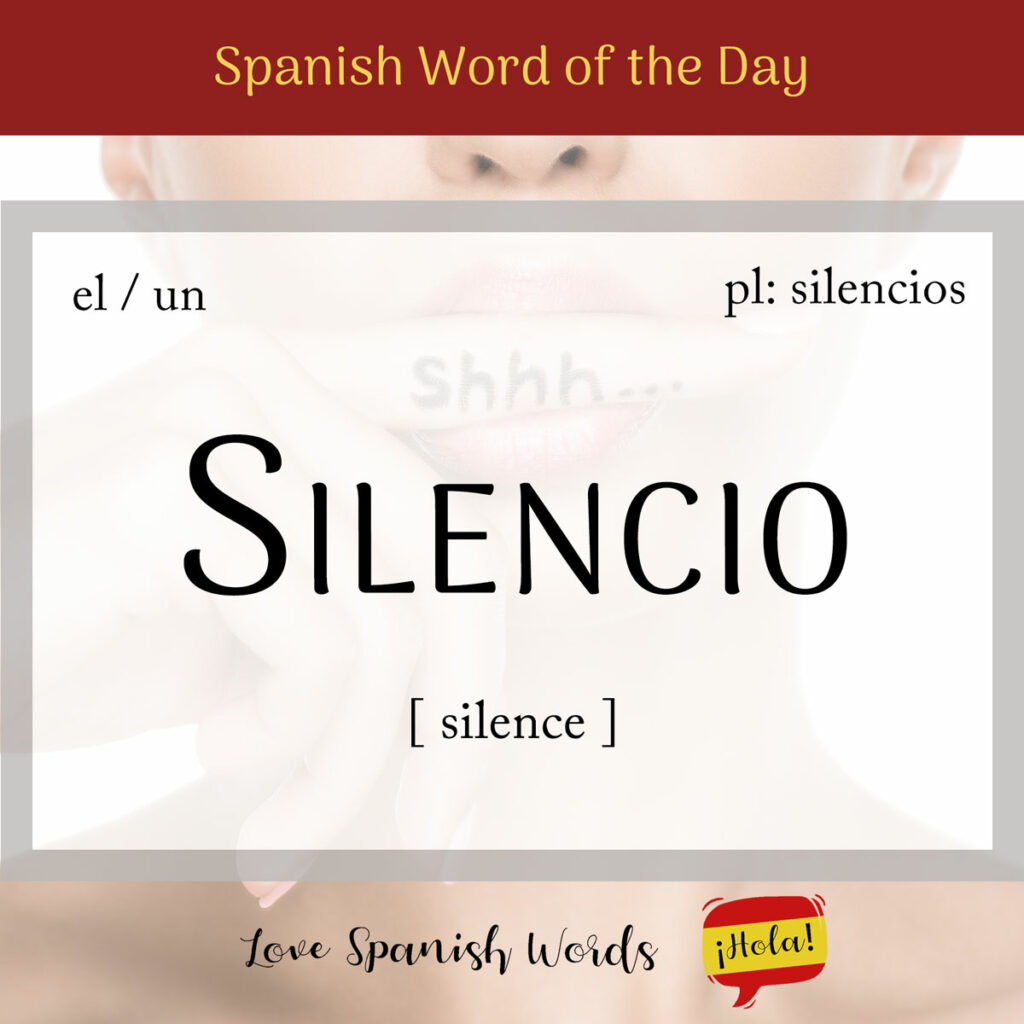The Spanish word silencio comes from the Latin word silentium, which means silence or stillness. The Latin root silens in turn comes from the verb silere, which means to be silent. It evolved into the Spanish word silencio and has retained the same meaning throughout its usage in Spanish-speaking cultures.
Latin American Pronunciation
European Pronunciation

Silencio is a masculine noun that takes the following definite and indefinite articles:
- el silencio = the silence
- un silencio = a silence
- los silencios = the silences
- unos silencios = some silences
It is often used in conjunction with other words. Let’s look at a few:
- silencio absoluto = absolute silence
- romper el silencio = break the silence
- momentos de silencio = moments of silence
- silencio sepulcral = deathly silence
- guardar silencio = keep silence
- silencio profundo = deep silence
- hacer silencio = to make silence (to give a moment of silence)
- silencio incómodo = awkward silence
- silencio perturbador = disturbing silence
- silencio total = total silence
- silencio reflexivo = reflexive silence
- silencio sagrado = sacred silence
The literal meaning of silencio in Spanish is the absence of sound. It is most commonly used to describe a situation where no sound or noise is happening from someone or something.
- El salón estuvo en silencio durante la prueba. = The classroom was silent during the test.
- La oficina estaba en completo silencio cuando llegué. =The office was in complete silence when I arrived.
La biblioteca estuvo en silencio durante el día.
The library was in silence during the day.
The word silencio can also be used figuratively to express a lack of communication or to represent a period of inactivity or inaction. This can be a silence between two or more people who don’t speak for any given reason or it can be a silence related to inactivity from someone who never gets back to your question or concerns.
- El silencio de las autoridades fue interpretado como una falta de interés. = The silence of the authorities was interpreted as a lack of interest.
- Después de discutir, hubo un silencio incómodo entre Jessica y Juan. = After arguing, there was an awkward silence between Jessica and Juan.
Silencio can also be used metaphorically or symbolically to signify something deeper, such as a pause for reflection or contemplation. This type of silence often involves meditation.
- El silencio antes de tomar una decisión es importante= Silence before making a decision is important.
- El silencio de la madrugada tenía una sensación de paz y tranquilidad. = The silence of early morning had a sense of peace and tranquility.
Después de la tormenta, se sintió un silencio profundo en el pueblo.
After the storm, a deep silence was felt in the town.
Synonyms for silencio are quietud (stillness), calma (calmness), and tranquilidad (tranquility). Antonyms include ruido (noise), sonido (sound), and alboroto (commotion).
Here are some derivatives for the word silencio:
- silenciosamente = silently
- silencioso = silent (adjective describing a situation/place)
- silencioso/a: silent (adjective for a person)
- silenciamiento = muting, silencing
- silenciar = to mute, to hush
Entré a la habitación del bebé silenciosamente para no despertarlo.
I entered the baby’s room silently so I wouldn’t wake him.

Spanish idioms and phrases featuring ‘silencio‘
El silencio es oro translates to silence is golden in English. This phrase refers to the idea that it is better to keep quiet than to speak at times.
Un silencio sepulcral translates to A deathly silence. It refers to an intense, profound silence that creates a feeling of stillness.
Romper el silencio
Literal translation: to break the silence
English meaning: to start talking after a period of quiet or to address a previously unspoken issue
Guardar silencio
Literal translation: to keep silent
English meaning: to choose not to speak or to remain quiet about something

